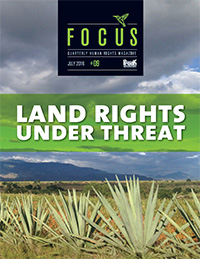 Today, men and women from all over Mexico are organizing to use their knowledge and the law to defend their land against destruction by so-called mega-development projects, including the extraction of mineral resources foreseen in Mexico’s energy reform.
Today, men and women from all over Mexico are organizing to use their knowledge and the law to defend their land against destruction by so-called mega-development projects, including the extraction of mineral resources foreseen in Mexico’s energy reform.
As land takeovers tear the social fabric of Mexico’s communities, the violation of the right to land is without doubt an extremely alarming aspect of the country’s human rights crisis.
In particular, the defense of the land has become a fundamental mission for indigenous and non-indigenous communities besieged by public policies and business practices that prioritize extraction of resources above any other use of the territory.
Although human rights law recognizes both economic, social, cultural and environmental rights (esc rights) and the collective rights of indigenous communities, our country lacks mechanisms to provide for the defense and justiciability of these rights.
The Inter-American Court of Human Rights and some decisions adopted by Mexico’s Supreme Court have established precedents that recognize that the right of indigenous peoples to their land must be respected above the ambitions of business projects that seek to extract natural resources. Yet even when communities achieve legal victories, these decisions often fail to lead to compliance.
Powerful economic interests in collusion with authorities who ignore court judgments and organized crime continue to threaten the communities.
One of the key lessons learned through these experiences is that prevention is a better strategy than waiting until a threat materializes. Strengthening community organizational networks and ensuring the active participation of women in these processes are two essential pillars for the successful, prevention-based defense of the land.
In this edition of Focus, which highlights the challenges facing the defense of land in Mexico, we analyze the experiences of communities and organizations who battle each day to retain their autonomy, their rights, and their land.
